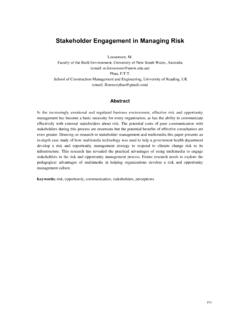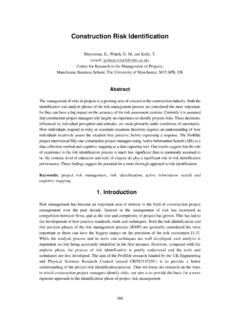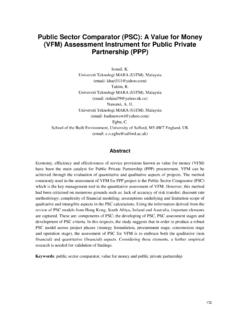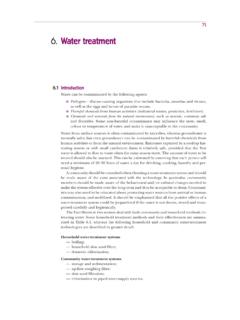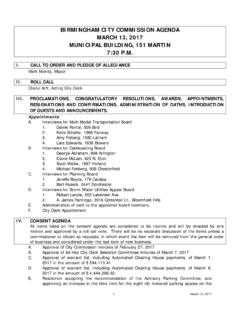Transcription of A Project Progress Measurement and …
1 A Project Progress Measurement and management system Sangyoon Chin1, Suwon Yoon1, Yea-Sang Kim1, Youngsoo Jung2, Soon-Chan Park3, and Moonhun Chung3 1) Dept. of Architectural Engineering, Sungkyunkwan Univ., Suwon 400-746, Korea 2) College of Architecture, CAUD, Myongji Univ., Yongin 449-728, Korea 3) Research Inst. of Construction. Technology, Samsung Corp., Seongnam 463-721, Korea , Abstract: A Progress management in construction projects plays an important role in providing as-built information for Project planning, control, cost engineering, and many others. However, Progress information has not been collected through objective methods or criteria but mainly based on an individual s own experience or subjective judgment, which results in the limits of consistency, objectiveness, and accuracy in the Progress management .
2 This research aims at proposing a Progress Measurement framework that allows managing and applying various Measurement methods dependent on work items to overcome the problems and limits of the current Progress management . The framework was developed with a focus on integration of work breakdown structure, cost breakdown structure, and Progress Measurement methods, and it consists of three main objects: work, activity, and Progress Measurement unit. Base on the framework, an information system named PROSYS ( Project Progress management system ) was developed to generate activities and Progress Measurement units depending on the characteristics of projects and work items, and to keep track of Project Progress more efficiently and effectively.
3 Keywords: Progress management , Progress Measurement , Information system 1. INTRODUCTION Project management information systems are increasingly applied at construction projects for more efficient management by collecting as-built information and supporting decision-making. Among the various types of as-built information, the Project Progress rate is one of the critical indices that represent the Project performance and Progress state, and it helps timely and accurate decision-makings by providing basic information that can be applied to Project planning and control as well as cost engineering. However, the Project Progress management has not been quite effective, since it has not been based on objective data or criteria, but based on subjective judgments and different criteria dependent on an individual s experiences or preferences [1].
4 Regarding research on the Progress management , Thomas and Mathews [2] classified the Progress management into three categories by the Progress Measurement method, which are estimated percent complete, physical Progress Measurement , and earned value. CII [3] and Flemming and Koppleman [4] classified the Measurement methods at more detailed level, and suggested the use of a different method depending on the work item or Project condition. However, there has been lack of a framework for applying various Measurement methods with considering a work item and Project characteristics based on objective and consistent criteria.
5 In most construction projects, Measurement methods are used inconsistently Project by Project without objective criteria, which make it more difficult to accumulate and reuse invaluable as-built information. The objective of this research is to develop a Progress Measurement framework, which supports to apply various methods with considering a work item and Project characteristics based on objective and consistent criteria. To do so, it was analyzed what kind of Measurement methods exist, and how they could be applied differently depending on the characteristics of a work item and a Project . Based on the methods, a Progress Measurement framework was developed to provide various Measurement methods, depending on work items and Project characteristics.
6 Finally, based on the proposed framework, an information system called PROSYS ( Project Progress management system ) was developed. 2. Progress management IN CONSTRUCTION PROJECTS The definition of the Progress management , Measurement methods, and their targets were studied through literature review. And they are discussed in the following sections. Definition of Progress management Generally, the Progress management is defined differently depending on the aspects of cost engineering and scheduling, respectively [5]. However, in overall view, the Progress management can be considered as the integration of cost and schedule [1].
7 Base on this definition, the Progress management in this paper is the Measurement and analysis of degree of Progress based on Measurement quantity as well as its budget, which is the same as budgeted cost work performed (BCWP) of Cost/Schedule Control Systems (C/SCS) [6]. Progress Measurement Methods and Targets Existing research on Progress management , listed in Table 1, suggested various Measurement methods and targets in Progress management . Measurement methods can be categorized into measuring, estimating, and checking, while targets can be classified into work quantity, milestone, process, and time.
8 Besides Eldin [7] developed a computer application for the Measurement of work Progress based on weighted milestones and earned value, and Choi [8] insisted that the effectiveness and efficiency of measuring Progress can be maximized through specifying major items that can represent the real work Progress . Although the existing research suggested various Measurement methods for work Progress , the Progress management has not been based on objective criteria but based on the manager s judgments and conveniences. In addition, the consistency and accuracy of work Progress can be improved through application of various Measurement methods and breakdown of Measurement targets at more detailed level, however, this would require tremendous time and efforts to build criteria and to collect data in each Project .
9 To the contrary, estimating work Progress would reduce the accuracy and consistency, although it does not need time and efforts that much. Therefore, there is a tradeoff relationship between accuracy/consistency and efficiency in Progress management [1] Accordingly, it would be very efficient to build a computerized system that allows various choices for Progress Measurement dependent on the degree of impact of a work for better accuracy and timeliness in Progress management . To do so, a framework needs to be developed to suggest and manage criteria, such as measuring methods, targets, and rules, and to apply them flexibly by work items and Project characteristics in a consistent and timely manner.
10 Table 1 Measurement Methods and Targets ResearchMeasurement Method Measurement TargetEstimated percent complete Progress state (Individual evaluation)Physical Progress Measurement Installed quantity Thomas & Mathews [2] Earned value Measurable level of work Progress Unit completed Installed quantity Incremental milestone, Milestone Start/finish, supervisor Start /finish point of work Opinion Progress state Cost ratio None CII [3] Weighted or equivalent units Finish point or Progress state of work Weighted milestones Finish point of weighted milestone Fixed formula by task Finish point of work (0-100) or Start /finish point of work (50-50) Percent complete & milestones gates Progress state based on milestone Earned standards None Apportioned relationships to discrete work None Fleming & Koppleman [4] Level of effort Time of work 3.



